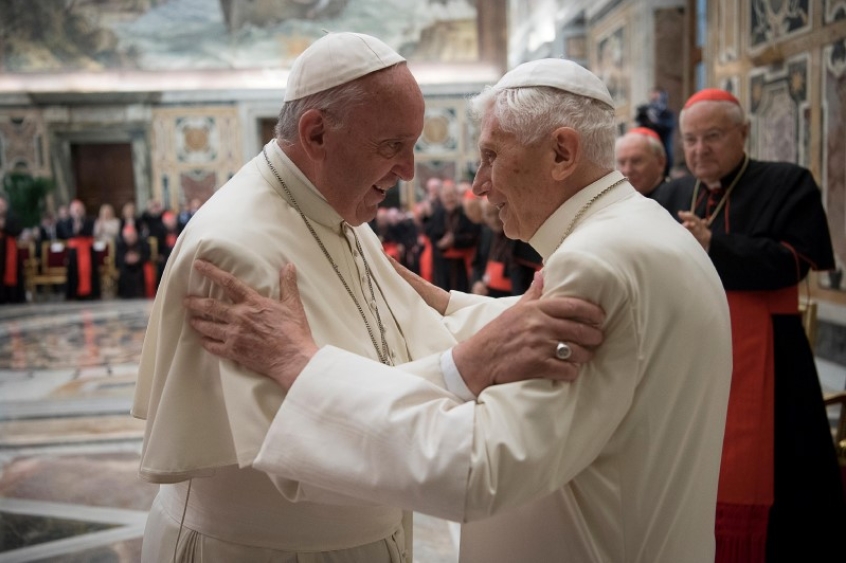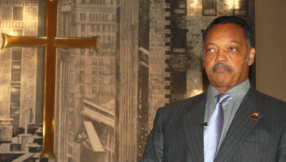Pope emeritus Benedict XVI has come out in defence of priestly celibacy in a new book out this week.
In From the Depths of Our Hearts: Priesthood, Celibacy and the Crisis of the Catholic Church, the Pope and co-author Cardinal Robert Sarah argue for the continuation of the centuries-old requirement that ordained priests remain unmarried.
The 92-year-old, who himself broke with centuries of tradition when he resigned as Pope in 2013, writes that "it doesn't seem possible to realise both vocations [priesthood and marriage] simultaneously".
The celibacy question has been pushed up the Church agenda in recent months after the Synod of Bishops for the Pan-Amazonian region approved a document last October supporting the ordination of married men as priests and the diaconal ordination of women.
In an unusual intervention for Pope Benedict, who has largely stayed out of Church affairs since stepping down six years ago, he writes that the question of priestly celibacy is of "great significance".
French newspaper, Le Figaro, previewing the book on Monday, reports that Pope Ratzinger and Cardinal Sarah penned the book "in filial obedience to Pope Francis" while "seeking the truth" in "a spirit of love for the unity of the Church".
In the book, the Pope emeritus pens one case in defence of celibacy, the cardinal another, with both coming together to write the introduction and conclusion.
In his section of the book, Cardinal Sarah writes that "there is an ontological-sacramental link between priesthood and celibacy".
"Any weakening of this link would put into question the Magisterium of the [Second Vatican] Council and Popes Paul VI, John Paul II and Benedict XVI," he writes.
"I implore Pope Francis to protect us definitively from such a possibility by vetoing any weakening of the law of priestly celibacy, even if limited to one region another."
He further argues that permitting the ordination of married men will amount to "a pastoral catastrophe, an ecclesiological confusion and an obscuring of the understanding of the priesthood".
Pope Benedict argues that "in the ancient Church" of the first millennium, "married men could receive the Sacrament of Holy Orders only if they committed themselves to sexual abstinence."
Speaking to journalists on a flight back from Panama last year, Pope Francis said he believed celibacy to be a "gift for the Church".

"I am reminded of that phrase of Saint Paul VI: 'I would rather give my life than change the law on celibacy. It came to mind and I want to say it, because it is a courageous phrase, in a more difficult moment than this, 1968 / 1970," he said.
"Personally, I think that celibacy is a gift for the Church. Second, I don't agree with allowing optional celibacy, no."
Ruth Gledhill, online editor of Catholic website The Tablet, said Benedict's intervention needed to be seen within the context of historic Catholic tradition.
"Benedict is known for his conservative views so it is not a surprise he takes this stance, although very interesting that he has felt the need to go public," she told Christian Today.
"It was on his watch that the Ordinariate was introduced, allowing married as well as unmarried Church of England clergy to become Catholic priests while retaining elements of their Anglican heritage. Even before that, some married Church of England clergy who left after the ordination of women priests was agreed, went on to become Catholic priests, after receiving special dispensation.
"I would regard Benedict's intervention as not in direct opposition to Francis, but as an attempt to prevent what he might fear could be exploitation by those who might wish to end the celibacy rule across the Church. In other words, it is more nuanced than it might at first appear and has to be understood in the context of centuries of Catholic tradition and teaching.
"The situations in various Ordinariates around the world, and in the Eastern Rite churches where married priests are allowed, are rooted in different contexts than the shortage of priests that pertains in the Amazon."













